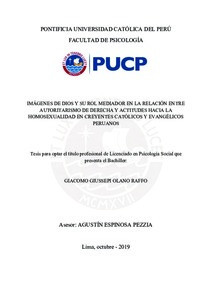Imágenes de Dios y su rol mediador en la relación entre autoritarismo de derecha y actitudes hacia la homosexualidad en creyentes católicos y evangélicos peruanos
Abstract
El estudio busca conocer la influencia que tienen las imágenes de Dios en la relación entre el
autoritarismo de derecha y las actitudes hacia población homosexual (e.g., unión civil,
adopción de niños y existencia de homosexuales) en una muestra de peruanos creyentes
(N=365). Se identifica desde el cristianismo una dicotomía en la representación de Dios; por
una parte, sería representado como una entidad benevolente; por otra, aparecería como un
juez castigador del pecado. Los resultados muestran que, de forma independiente, ambas
imágenes se asocian positivamente con el autoritarismo de derecha, aunque es con la visión
castigadora de Dios donde se aprecia una mayor magnitud de la relación. Del mismo modo,
ambas imágenes se asocian inversamente con las actitudes positivas hacia la homosexualidad,
observándose nuevamente que la magnitud de la relación es mayor con la imagen castigadora
de Dios. Sendos análisis de mediación establecen que la relación entre el autoritarismo de
derecha y las actitudes negativas hacia la homosexualidad están mediadas por la imagen
castigadora de Dios, pero no por la imagen benevolente. Finalmente, una segmentación de los
participantes a partir de un cluster analysis, utilizando el nivel de acuerdo con ambas
imágenes de Dios, identificó dos grupos de creyentes. El primer grupo denominado no
fundamentalista reportó un nivel alto de acuerdo con la imagen benevolente y un nivel bajo
de acuerdo con la imagen castigadora, mientras que el segundo grupo, nombrado como
fundamentalista, reportó altos niveles de acuerdo tanto con la imagen benevolente cuanto con
la imagen castigadora de Dios. Las comparaciones entre los dos grupos muestran que los
segundos son sistemáticamente más autoritarios y reportan actitudes más negativas hacia la
homosexualidad. La discusión retoma la idea de que la religión, a partir de las
representaciones de Dios, tiene un efecto paradójico en el prejuicio siendo el componente
castigador de la visión fundamentalista el que actúa como un factor de riesgo en la valoración
de la homosexualidad. The study seeks to know the influence of the images of God in the relationship between rightwing
authoritarianism and attitudes toward the homosexual population (eg, civil union,
adoption of children and existence of homosexuals) in a sample of Peruvian believers in God
(N = 365). A dichotomy in the representation of God has been identified from Christianity;
on the one hand, God would be represented as a benevolent entity; on the other hand, he
would appear as a judge who punishes the sin. The results show that, independently, both
images are positively associated with right-wing authoritarianism, although it is with the
punishing vision of God that a greater magnitude of the relationship is seen. In the same way,
both images are inversely associated with positive attitudes towards homosexuality,
observing again that the magnitude of the relationship is greater with the punishing image of
God. Both mediation analyzes establish that the relationship between right-wing
authoritarianism and negative attitudes towards homosexuality are mediated by the punishing
image of God, but not by the benevolent image. Finally, a segmentation of the participants
from a cluster analysis, using the level of agreement with both images of God, identified two
groups of believers. The first group called non-fundamentalist reported a high level of
agreement with the benevolent image and a low level of agreement with the punishing image,
while the second group, named as fundamentalist, reported high levels of agreement with
both the benevolent image and the punishing image of God. Comparisons between the two
groups show that the latter are systematically more authoritarian and report more negative
attitudes toward homosexuality. The discussion returns to the idea that religion, based on
representations of God, has a paradoxical effect on prejudice, being the punishing component
of the fundamentalist vision that acts as a risk factor in the assessment of homosexuality.
Temas
Fundamentalismo religioso--Aspectos políticos
Homosexualidad--Aspectos religiosos--Cristianismo
Homosexualidad--Aspectos religiosos--Cristianismo
Para optar el título de
Licenciado en Psicología con mención en Psicología Social
Collections
The following license files are associated with this item:






